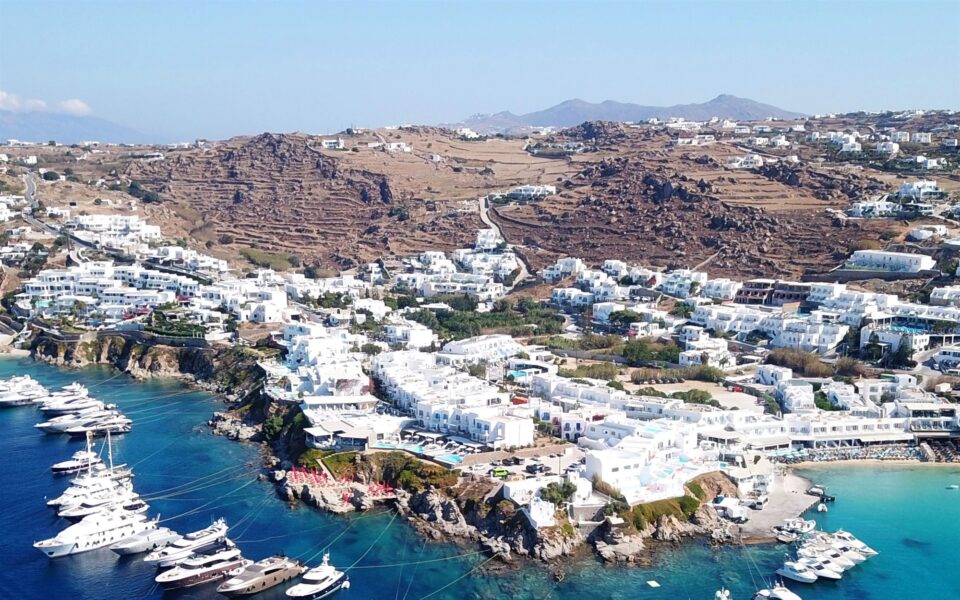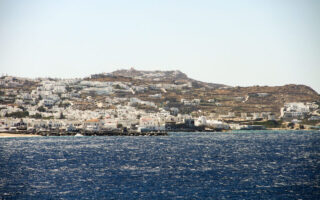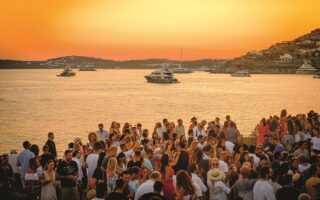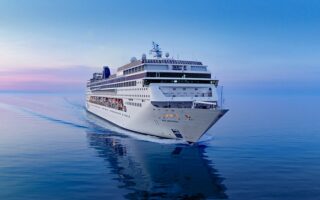Mykonos falls victim to its own success
Businesspeople on the wildly popular Cycladic island talk about the challenges driving visitors away

Despite promising signs for other parts of the country as regards the number of flights and seat bookings for the 2024 tourism season, Mykonos is seeing a decline in both indices for the second year in a row.
More specifically, according to scheduling plans for March-October by the carriers serving the destination, a 9.2% drop in the number of seats is foreseen this year compared to last, which had also seen a decline in bookings and flights. In contrast, for Greece as a whole, the number of airplane seats planned for the March-October season has risen 10.2% against 2023, figures from the Airdata Tracker of the Institute of the Greek Tourism Confederation (INSETE) show.
Even more telling of the shadows looming over Mykonos is the fact that active airline seat bookings made since the start of the month for the rest of the year have plummeted by 26.1% compared to last year, when the nationwide total is up 7.5% against 2023.
This decline comes on top of a year-on-year drop of 5.9% in passenger traffic coming to the island from abroad compared with 2022, data from Fraport Greece has shown.
So, what is ailing Mykonos? Is it the overtourism, high prices, inadequate infrastructure and rising crime that come as a result of resounding success at so many international destinations?
“Mykonos has clearly been in a correction phase since last year, resulting from the extremely demanding pricing policies of all of the tourism businesses on the island, as well as from defamation by visitors and the inevitable mistakes,” a hotelier with a significant number of units at this and other summer destinations told Kathimerini on condition of anonymity.
“When the magnifying glass of social media is on you for all the right reasons, it will also draw an equal amount of attention, if not more, to the bad things,” said another businessman who works on the island.
Both are, nevertheless, optimistic that this year’s performance will not be as bad as the data so far indicate, but also that a self-correction in the private sector will lead to a rebound.
Many more believe that the Mykonos brand is too strong to fail and can ride out what may be nothing more than a short-lived crisis. Where is the negative sentiment coming from, though? It is the result of a combination of factors. In one case, for example, global influencer Gigi Hadid was burgled while holidaying on the island in 2019 and advised her millions of followers not to travel to the Greek island.
Inadequate infrastructure is another issue, as many holidaymakers have witnessed in previous years when the island’s waste management system overflowed. Crime, particularly robberies, is another problem that has been mentioned as contributing to Mykonos’ declining allure.
On the upside, satisfaction with Mykonos’ hotel infrastructure remains among the highest in the Mediterranean, according to INSETE’s findings.
‘In today’s world, it is only a matter of seconds before every oversight and incident is made known across the world because of social media’
Negative publicity and a drop in demand for traveling to the island is, therefore, also interpreted as a reproof for the services offered beyond the hotels, such as at certain beach bars and restaurants or stores. “One bad apple can spoil the entire barrel,” said one top-league Greek hotelier who believes Mykonos is suffering from a reputation problem.
Others think the dip is the inevitable result of overtourism and high prices. “The phenomenon is not endemic to Mykonos. We have seen the same thing happen at other famous destinations, such as Spain’s Ibiza, for example,” said another hotelier on the island who, like the others, spoke to Kathimerini on condition of anonymity.
“A handful of businesspeople, restaurateurs and beach club managers did not pay as much attention as they should have to the standards of the services they offer and focused only on making as much money as possible,” the same hotelier said, adding that “in today’s world, it is only a matter of seconds before every oversight and incident is made known across the world because of social media.”
Outrageously high bills, nontransparent pricing policies, poor service and security matters are among the problems that get a lot of publicity on social media platforms.
“Like other destinations before it, Mykonos has fallen victim to its success, though temporarily,” a local businessman argued, arguing that the arrival of the super-rich set on the island brought its followers, but also criminal elements. Pickpockets, thieves slipping expensive watches off people’s wrists as they stroll around packed Matogianni Street or party at a nightclub, but also robbers, who break into people’s rooms and villas to grab what they can regardless of whether the tenant is in, and serious drug rackets are the most frequent subject of complaints about rising crime on the island.
This is also attributed to the lack of policing, which became widely apparent last year and prompted law enforcement authorities to dispatch a special unit to Mykonos.
The initiative, however, was geared more toward protecting state workers from violence than cracking down on crime more generally.
“Mykonos is a victim of defamation but it will bounce back stronger because the businesspeople on this island are serious professionals who have successfully diagnosed the problem and are doing what is necessary to make it right,” an economist specializing in tourism told Kathimerini. “Self-corrective initiatives are already under way and the serious professionals and healthy businesses are exerting pressure on those who fail to understand what needs to be done.”
Investments & measures
This optimism for Mykonos’ future is shared by many Greek and foreign investment funds and luxury hotel management firms which are in the process of carrying out major investments, worth hundreds of millions of euros, in new comprehensive tourism complexes.
For others, overdevelopment and burgeoning construction are a key part of the problem.
Either way, no one can deny that the idealized image of Mykonos with its sugar-cube houses, picturesque windmills and colorful fishing boats bobbing on the sparkling blue waters is at risk of being lost in the throngs of visitors who descend on the island each year.
What’s more, many of these visitors are day-tourists who contribute almost nothing to the tourism economy’s turnover.
According to sources, efforts are indeed under way to set a cap on the number of cruise ships and cruise passengers stopping at Mykonos.





